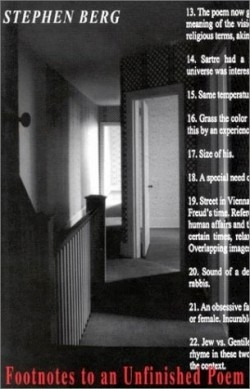Footnotes to an Unfinished Poem
As the title advertises, this new book is not itself a poem but the footnotes to one that the author insists exists only as “a text that its unnamed author could only fractionally complete.” Since T. S. Eliot added his famous footnotes to “The Waste Land,” perhaps the most studied if not the most loved poem of the last century, the business of annotating one’s own work has become a common practice, though one much derided by devotees of the plain style.
A book of poetry with no poem at all, with nothing but the footnotes, may sound like the ultimate in dusty, boring academic exercises, and Berg is clearly aware that he is taking a big risk. Yet readers willing to give this book a chance will find many unexpected pleasures in its oblique narrative.
His notes for what might be a six-part poem about the love affair of a fifty-two-year-old man and a nineteen-year-old woman include teasing glimpses of erotic interludes and philosophical overtones, as well as a vast and diverse stream of references. On just two pages the reader can find Beethoven’s late Quartets, the Zen master Ikkyu, Dante, Dickinson, Heraclitus, Kierkegaard, Socrates, and Groucho Marx. It is hard to imagine a poem with all these sources not buckling under their weight; oddly, however, even with such large and ponderous materials, this approach allows Berg a certain lightness. Fragmentary glimpses and uncertain implications are only to be expected because, after all, these are “only” the notes—who can complain if they fail to tell the whole story?
Many delights are to be found in the juxtaposition of less-than-random details: from “Usually made of plastic… wooden ones must be carefully finished to prevent splinters” to “Top string on Irish lyre” to “Sliced thin, with mustard.” Piecing together a fully coherent narrative from the fragments is less easy, and perhaps beside the point. Engaging readers with what plainly is a wealth of knowledge and a deeply philosophical sensibility, hinting coyly at physical pleasures he declines to describe fully, refusing to cater to our yearning for a clear, simple story, Berg offers an innovative and intriguing document with a charm all its own.
Reviewed by
Jeff Gundy
Disclosure: This article is not an endorsement, but a review. The publisher of this book provided free copies of the book to have their book reviewed by a professional reviewer. No fee was paid by the publisher for this review. Foreword Reviews only recommends books that we love. Foreword Magazine, Inc. is disclosing this in accordance with the Federal Trade Commission’s 16 CFR, Part 255.

